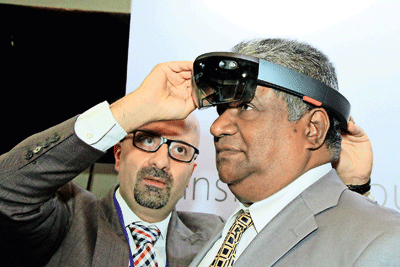Doctor, lay down your scalpel for the digital age is here
View(s):By Alvin Sallay

Deputy Health Minister Faizal Cassim trying out the Microsoft Hololens at the Medical conference last week.
Wonder what Kay Scarpetta, the central character in the Patricia Cornwell crime novels, will do? Will she lay down her scalpel and pick up a scanner for that is the future of forensic pathology, a future where an autopsy will mean there will be no need to cut up a dead body.
Scans not scalpels was the thrust of the engrossing talk delivered by Darren Brown who told the audience at the Commonwealth Medical Association sessions in Colombo last week that digital autopsy was the future of post-mortem examinations.
The head of business development of the UK-based company IGene Global said technology would transform forensic pathology on its head. The use of 3D visualisation software would eliminate the need to cut the body. A CT scan would establish the cause of death and the body could be released back to the family in 15 minutes.
Records could be stored digitally (having a digital body on file) doing away with exhumations – as in the recent case of Lasantha Wickrematunga – thus avoiding piling more pain on the family. Scans would also mean no invasive procedures resulting in helping to adhere to religious sensibilities and maintain the dignity of the deceased.
“Changing the mindset for a process (autopsy) which has been happening for the past 300 years in the UK was difficult but we have turned the corner. Every year there are around 200,000 deaths which need a post-mortem. Over 70 per cent of these cases can be concluded using digital autopsy which can successfully determine the cause of sudden death,” revealed Brown.
It costs around 500 pounds sterling plus taxes for a digital autopsy in the UK and the data acquired from the scan is securely stored for an indefinite period.
“We have three sites in the UK and six more are being planned. This technology is also being used in Malaysia and Australia, and hopefully soon in Sri Lanka,” Brown wished.
Many doctors in the audience were seen to be nodding their heads in approval. Certainly the Colombo Medical College would love to take on this technology for apparently there is a dearth of dead bodies for their medical students to practice on. “Our technology is training future medical students,” pointed out Brown, one of the speakers on the opening day of the medical conference being held in Sri Lanka for the first time. The theme ‘digital health for health and wellbeing’ focused on the use of ICT for healthcare services.
Technology also provides doctors at your fingertips as showed by another London start-up Babylon Health which helps people talk to a doctor through a mobile phone using an app.
Rabin Yaghoubi, the chief commercial officer of the company revealed the few easy steps by which anyone who felt ill could find out what was wrong and consult a doctor – firstly ask questions which will be answered by AI (artificial intelligence) who will check the symptoms with you, and if there was a problem take steps to book an immediate consultation with a doctor.
“In the UK, one in 300 people are using our App and by next year we hope to increase that number to one in 100,” Yaghoubi outlined. “We began in a reactive mode where we help by booking a consultation but we now also offer assistance (how to lose weight for example) and also have a predictive mode where the AI will ask if you have been sleeping well if the signs are there.”
The technology will be a boon to healthcare in countries which cannot afford to build expensive facilities (hospitals) and expect the people to come to them.
Like Digital Autopsy, the use of a mobile App to check your health also needs a change in mindset according to Yaghoubi. “The biggest challenge like any other disruptive technology is that it requires a fundamental change in behaviour – seeing a doctor on video of hearing his voice is better than visiting the GP.
“But over time, the younger generation will seek this service through their mobiles. They have access to everything on their smartphones today, from buying clothes to watching movies and we expect a large part of the population to use our service,” he added.
A local version of this service –ODOC – will soon be available according to Heshan Fernando, CEO of the company. Watch this space.


